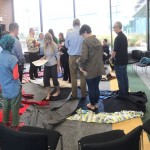Last November, Chief Wilton Littlechild, Mayor Don Iveson and MLA Rod Loyola sat with Edmonton Heritage Council’s board and staff to speak about their vision of how Edmontonians would live into (and beyond) the Truth and Reconciliation Commission’s (TRC) Calls to Action.
At the time, the release of the final report of the TRC was a few weeks off. But it was abundantly clear for EHC that the path of reconciliation (and the specific TRC Calls to Action) was one that we would need to “live into” as members of the communities and peoples bound by Treaty 6.
Each of our guests that November evening brought their own remarkable stories: Chief Littlechild as a residential school survivor, community leader, athlete and TRC commissioner; Mayor Iveson as an honorary witness at the final TRC event in Edmonton in 2014 drawing on power of that experience in defining his mayoralty; and Mr. Loyola’s childhood experience coming to Alberta in the wake of the Pinochet coup d’état and dictatorship—and the subsequent rupture and dislocation of Chilean families.
That initial conversation confirmed we needed to learn more and also help well Edmontonians learn more. We’ve continued the internal discussion in different ways: planning responses to specific TRC Calls to Action, reviewing our programs to support individuals and organizations committed to reconciliation, and encouraging all people and organizations we work with to find a meaningful path in this important time in Edmonton’s and the country’s history. We’ve supported work in the community such as Reconciling Edmonton, the Ghosts of Camsell and the related Camsell Hospital Symposium and film production projects, or the good work of the Mill Woods Living History Project on the Papaschase First Nation.
- Blanket exercise with EHC Staff and Directors
This evolution around reconciliation isn’t yet manifest in EHC’s messages and programs, but it will be. This isn’t easy work, nor is it a simple checklist of things we intend to do. For EHC staff and board, it requires much more internal exploration of what reconciliation asks of us to do differently, both personally and professionally.
Some will say that the TRC Calls and reconciliation have little if anything to do with their particular interests in history and heritage. On the surface, that may seem to be. But if we live in this city and region, our relationships with Indigenous communities and people is at the foundation of our history and heritage, no matter one’s cultural background, or number of generations of family presence, or personal or organizational interests.
I believe this is the foundational cultural work we all have in common and is becoming the essence of what it means to consciously live here. Without this acknowledgement and the actions it will require, the stories of our origins and experience are at best incomplete and at worst, false. Living into reconciliation, I believe, is actually an invitation to all of us greater meaning and understanding of our lives. That’s what culture is all about.
All culture and heritage work is about reconciliation: it’s acknowledging what has happened in the past, understanding why and how it happened, and then making good decisions about what goes in an inclusive and healthy future for the present and next generations. We now have the gift of the Truth and Reconciliation Commission Calls to Action to make our true work in culture and heritage abundantly clear.
If you’re interested in reading more, there lots out there. For a start, I recommend this Taproot story by Anna Holtby, Making a Ripple Towards Reconciliation, which features Miranda Jimmy, EHC program manager and her work with Reconciliation in Solidarity Edmonton.
